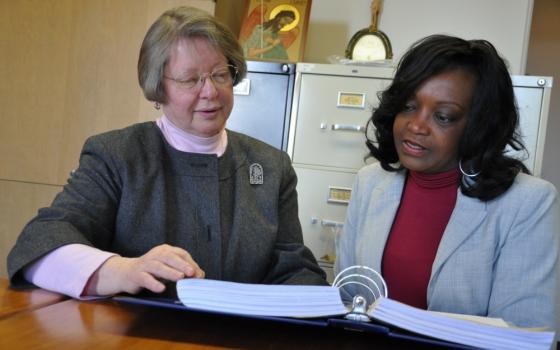Grace Sbrissa, a Sister of St. Joseph, never imagined she would have any career but teaching. But after being appointed as her community’s treasurer and earning a subsequent master’s degree in business administration to prepare for the role, Sbrissa soon found herself on a different path: financial planning.
Almost three decades and several financial management roles later, Sbrissa is now a financial management consultant at Brenner, McDonagh & Tortolani where she helps religious congregations plan for the future.
Your original ministry was teaching. In what ways do you view your current work as your ministry?
As a vowed religious woman, my whole life has been dedicated to ministry. So, right now, how do I consider my work to be ministry? These congregations that we work for are all doing really good work –whether it's in healthcare or teaching or social services or contemplation, and I help them to be financially viable and to plan ahead so that there's longevity. And so that's my ministry – to be in service to them, to help them to thrive or at least to survive – or to make the transition to ease out in a way that they can leave a legacy behind them.
Transition is a major theme in religious life these days. What trends are you seeing as congregations transition?
Well, as religious congregations are bravely facing what the demographics and the finances tell them, I think they're getting into more planning. What I see is they are doing more collaboration. It used to be that in religious congregations, we didn't talk with other congregations. We didn't tell them what we were doing or what our finances were like, and now there's a lot more sharing and collaboration.
Also, I think religious congregations are extending outreach as much as they can – beyond themselves, so they're not navel-gazing. There are fewer and fewer buildings, there are different ministries, and there are invitations to other people to collaborate. Those are the trends that I see. And from a financial standpoint, that means a lot of things. It means planning well how they invest their money so that it lasts, and it means downsizing buildings. Sometimes we have buildings that are much too large for us. And that's a huge expense – money that could be put into ministry.
What financial advice do you wish you could give to all congregations?
Plan. Plan ahead. Know what's going on. Engage your members; keep them informed and brainstorm with them. And then collaborate. I can't stress collaboration enough – that religious congregations work with each other, help each other, plan together. There's lots of help available; for example, there's the NRRO, there's RCRI, there's LCWR. Collaborate with each other and with all these units that can help with planning.
I also think they have to 'rightsize.' We're not going to be the kind of religious congregations that were around 50, 60, 70 years ago, but the church has changed and people have changed. The laity are taking on more and more of what religious did themselves like the hospital systems and the education systems. People are more involved in spreading faith and supporting issues and letting people know about issues like water and nuclear energy and immigration. So there needs to be downsizing, not only to meet needs, but also to welcome other people to collaborate with us.
I have to say, I'm very proud to be a religious woman in our country at this time. And it's very difficult because it's misunderstood in many ways, but I think we're working our way through that. I'm proud of who we are as religious women and how we started years and years ago, even before Vatican II, to plan ahead to the changing needs in our congregations. We educated our sisters and we started looking at our financial situation at a time when none of that was shared. I think we took some big risks, and it put us ahead of the game. I'm delighted to be living in this time and to be part of that.
[Dawn Cherie Araujo is a staff reporter for Global Sisters Report.]

